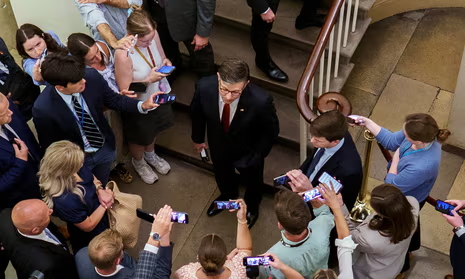In an election season marked by economic uncertainty, former President Donald Trump has returned to the national spotlight with a bold legislative proposal that blends tax reform with significant public investment. Dubbed by critics as “tax-and-spend” and by supporters as “smart stimulus,” Trump’s sweeping bill has ignited passionate reactions. Perhaps surprisingly, it’s Republican voters who are among the bill’s most vocal supporters — and they’re calling it a “no-brainer.”
The legislation, which aims to cut taxes for working families and small businesses while injecting massive funds into infrastructure, manufacturing, and energy independence, represents a pivot from traditional conservative orthodoxy. While past Republican doctrine emphasized spending cuts and deficit control, Trump’s bill charts a new course. And according to many GOP voters, it’s a necessary evolution.
A Trumpian Twist on Fiscal Policy
Trump’s proposed legislation includes robust tax cuts for the middle class, an expansion of the Child Tax Credit, and new incentives for American manufacturing. But it doesn’t stop there. The bill also proposes hundreds of billions in spending on roads, bridges, clean energy, veterans’ care, and border security.
This blend of populist tax relief and government investment diverges from the Reagan-era “small government” ideals. Still, it resonates with Trump’s political brand, which has always prioritized results over ideological purity. Supporters argue that this practical approach speaks directly to the needs of working-class Americans — many of whom have felt left behind by both parties.
“It’s finally a bill that does something for regular people,” said James Caldwell, a contractor from Ohio. “I’m a lifelong Republican, and I say this bill is a no-brainer. It helps families, it brings jobs back, and it doesn’t just throw money overseas.”
The Working-Class Conservative Surge
Trump’s realignment of the Republican Party into a working-class movement continues to reshape policy expectations. Many of his voters, especially in Rust Belt states, favor government intervention — so long as it benefits Americans first. For them, Trump’s legislation offers a middle ground: support for business and workers without veering into what they consider Democratic-style “handouts.”
Melissa Hernandez, a nurse and mother of three in Arizona, echoed this sentiment. “I never thought I’d support a spending bill, but this one is different. It’s focused on us, not on corporations or foreign governments. Trump’s thinking about American families.”
The bill has drawn strong approval from Republican voters who have struggled with inflation, rising housing costs, and stagnant wages. By offering direct relief and job growth initiatives, it addresses kitchen-table issues — a key reason many conservative voters view it favorably.
Critics Cry Foul, Supporters Stand Firm
Despite the groundswell of grassroots support, not everyone in the GOP is on board. Some establishment Republicans have criticized the bill for its hefty price tag, warning that it will add to the national debt and stray too far from conservative fiscal values.
Senator Rick Thurston of Texas, a vocal critic, argued, “Republicans should stand for limited government. We can’t afford to spend our way into prosperity.”
But for many Republican voters, those criticisms fall flat. Trump supporters argue that decades of conservative rhetoric on austerity have failed to produce tangible results for the middle class. “We tried the cuts and the deregulation. It helped Wall Street, but not us,” said Roger McMillan, a retired auto worker in Michigan. “This bill is finally about Main Street.”
A New Republican Coalition?
Trump’s approach is more than policy — it’s strategy. By fusing elements of economic nationalism with traditional Republican themes of tax relief and job creation, he is crafting a new coalition. This includes blue-collar workers, small-business owners, rural Americans, and even some minorities who see the plan as addressing long-neglected needs.
Polls indicate that a majority of Republican voters support the bill. Many are encouraged by its investments in manufacturing and energy — sectors seen as vital to both national security and economic stability.
“It’s about time we had a Republican plan that looks to the future,” said Darryl Simmons, a veteran and independent voter leaning Republican. “This is how you win over moderates and independents. Not with culture wars — with results.”
Shifting the Debate on Spending
Trump’s bill also forces a rethink of how Republicans talk about government spending. Traditionally framed as irresponsible or dangerous, spending now becomes a tool for national revival — so long as it’s focused on American interests.
Economists from both sides of the aisle have noted that strategic investments in infrastructure and manufacturing can yield long-term gains. Trump’s team argues that the bill will pay for itself through job creation and economic growth.
Still, the balancing act between spending and fiscal responsibility remains a point of tension. Conservative think tanks have urged caution, warning that ballooning deficits could hurt future generations. Yet, among voters, that concern seems secondary to more immediate struggles.
“Debt is important, but so is survival,” said Lisa Brewster, a single mother in Georgia. “I can’t worry about 2050 when I’m struggling to make rent in 2025.”
Culture, Identity, and Economic Security
What makes Trump’s proposal so appealing to his base isn’t just the dollars and cents — it’s what the bill symbolizes. It reaffirms their belief that Trump is fighting for them, not for elites or foreign interests. That sense of cultural affirmation is deeply powerful, and it’s why even controversial parts of the bill — such as increased tariffs on imports — have been met with approval.
“This isn’t just policy. It’s about our identity,” said Marcus Talley, a truck driver from Pennsylvania. “We’ve been ignored for too long. Trump’s putting America first, and this bill proves it.”
The Road Ahead
Trump’s legislative push faces obstacles in Congress, especially from fiscally conservative Republicans and Democrats wary of endorsing a major Trump proposal in an election year. But the growing support from Republican voters has already shifted the conversation.
If passed, the bill could become a defining moment in the evolution of the Republican Party — from a party of business interests and budget hawks to one centered on economic populism and national rebuilding.
More importantly, it offers a glimpse into how Trump plans to campaign in 2025 and beyond. Not just as a culture warrior, but as a builder — of roads, jobs, and a new Republican identity.
For many of his supporters, it’s already a done deal.
“This bill checks all the boxes,” said Caldwell. “You help working people, grow the economy, secure our country. What’s not to like? It’s a no-brainer.”



